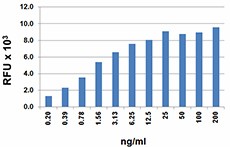- Regulatory Status
- RUO
- Other Names
- 6CKine, Secondary lymphoid tissue chemokine (SLC), Exudos 2, Small inducible cytokine subfamily A, member 21 (SCYA21)

-

Mouse CCL21 chemoattracts BaF3-hCCR7 transfectants.
| Cat # | Size | Price | Quantity Check Availability | ||
|---|---|---|---|---|---|
| 586402 | 10 µg | $147.00 | |||
| 586404 | 25 µg | $253.00 | |||
| 586406 | 100 µg | $686.00 | |||
CCL21 is a CC chemokine highly expressed in lymph nodes. CCL21 is only 32% identical to CCL19 at the amino acid level; nevertheless, these chemokines bind to the same receptor CCR7. CCL21 has a unique extension of about 30 amino acids with two extra cysteine residues in its carboxyl terminus. CCL21 is expressed in synovial tissue in rhematoid arthritis (RA), and it has been suggested that CCL21, but not CCL19, induces human microvascular endothelial cell (HMVEC) migration and/or tube formation. In addition, it has been reported that sustained high concentrations of either soluble or immobilized CCL19 and CCL21 inhibit T cell proliferation and IL-2 secretion.
Product Details
- Source
- Mouse CCL21, amino acids Ser24-Gly133 (Accession# P84444.1) was expressed in E. coli.
- Molecular Mass
- The 110 amino acid recombinant protein has a predicted molecular mass of approximately 12 kD. The DTT-reduced and non-reduced protein migrate at approximately 16 kD by SDS-PAGE. The N-terminal amino acid is Serine.
- Purity
- >98%, as determined by Coomassie stained SDS-PAGE.
- Formulation
- 0.22 µm filtered protein solution is in PBS.
- Endotoxin Level
- Less than 0.01 ng per µg cytokine as determined by the LAL method.
- Concentration
- 10 and 25 µg sizes are bottled at 200 µg/mL. 100 µg size and larger sizes are lot-specific and bottled at the concentration indicated on the vial. To obtain lot-specific concentration and expiration, please enter the lot number in our Certificate of Analysis online tool.
- Storage & Handling
- Unopened vial can be stored between 2°C and 8°C for up to 2 weeks, at -20°C for up to six months, or at -70°C or colder until the expiration date. For maximum results, quick spin vial prior to opening. The protein can be aliquoted and stored at -20°C or colder. Stock solutions can also be prepared at 50 - 100 µg/mL in appropriate sterile buffer, carrier protein such as 0.2 - 1% BSA or HSA can be added when preparing the stock solution. Aliquots can be stored between 2°C and 8°C for up to one week and stored at -20°C or colder for up to 3 months. Avoid repeated freeze/thaw cycles.
- Activity
- Bioactivity was measured by its ability to chemoattract Baf3-hCCR7 cells in a dose dependent manner.
- Application
-
Bioassay
- Application Notes
-
BioLegend carrier-free recombinant proteins provided in liquid format are shipped on blue-ice. Our comparison testing data indicates that when handled and stored as recommended, the liquid format has equal or better stability and shelf-life compared to commercially available lyophilized proteins after reconstitution. Our liquid proteins are verified in-house to maintain activity after shipping on blue ice and are backed by our 100% satisfaction guarantee. If you have any concerns, contact us at tech@biolegend.com.
- Product Citations
-
Antigen Details
- Structure
- Chemokine
- Distribution
-
CCL21 is highly expressed in HEV of lymph nodes and Peyer's patches. Also, it is expressed in the T cell zones of lymph nodes, in Peyer's patches by reticular cells, and in spleen by stromal cells. CCL21 is expressed by endothelial cells in lymphatic venules.
- Function
- CCL21 chemoattracts naïve T cells and mature dendritic cells (DCs) into T zones of secondary lymphoid organs. CCL21 and CCL19 chemoattract antigen-engaged B cells to the boundary of B and T zones to interact with T-helper cells. CCL19 and CCL21 inhibit apoptosis in DCs.
- Interaction
- Naïve CD4 and CD8 T cells, mature dendritic cells
- Ligand/Receptor
- CCR7
- Cell Type
- B cells, Dendritic cells, Tregs
- Biology Area
- Angiogenesis, Cell Biology, Immunology
- Molecular Family
- Cytokines/Chemokines
- Gene ID
- 18829 View all products for this Gene ID
- UniProt
- View information about CCL21 on UniProt.org
